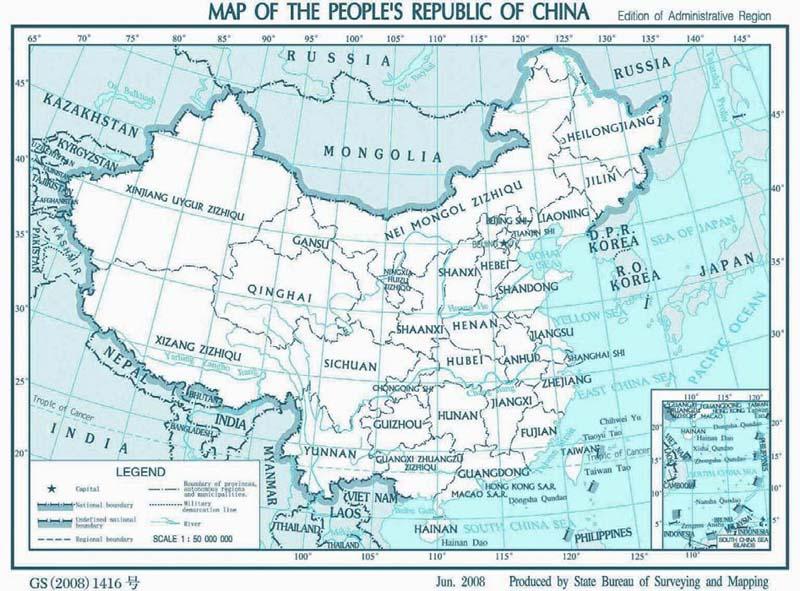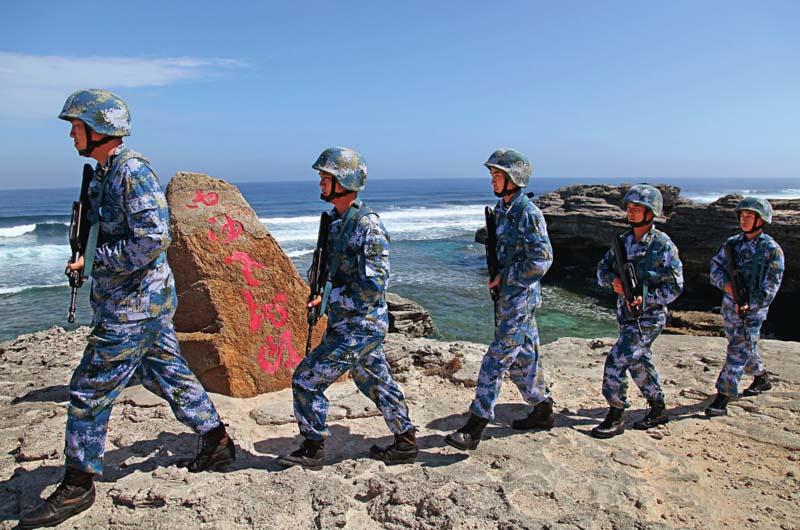China Steadfastly Safeguards Peace and Stability in the South China Sea
By WU SIKE



THREE years later, the dramatic arbitration on the South China Sea issue choreographed by the Philippines approaches its end. Since the U.S. inflated the South China Sea issue at the 2010 meeting of foreign ministers of ASEAN member states, and later announced its rebalance to Asia Pacific strategy, tranquility in the South China Sea has been shattered by the commotion surrounding socalled “freedom of navigation,” “militarization,” and the latest “arbitration.” The region is now a focus of media attention. What, as some foreign friends have asked me, exactly is up in the South China Sea?
Chinas Indisputable Sovereignty over the South China Sea Islands
China was the first country in the world to discover, name, administrate, and develop the islands in the South China Sea. Successive Chinese governments have exercised jurisdiction over these islands and adjacent waters through such means as administrative management, military patrols, production and business operations, and rescue activities at sea. During WWII, Japan seized the Xisha and Nansha islands. They were restored to China after the war in compliance with the Cairo Declaration and Potsdam Proclamation. China stationed troops and built military and civilian facilities on the islands, so exercising legitimate and de facto sovereignty over them.
In the decades leading up to the 1970s, it was widely recognized in the international community that the South China Sea islands belong to China, and not a single country raised objections on this account. As to the Philippines, the scope of its territory is defined in the 1898 Treaty of Peace between the United States of America and the Kingdom of Spain (Treaty of Paris) and other pacts. They clearly specify 118 degrees east longitude as the western limit of Philippine territory. Chinas islands and reefs in the South China Sea are all located west of that line.
In blatant disregard of this fact, the Philippines has occupied, step-by-step, Chinas islands and reefs since rich oil and natural gas reserves were detected in the region in the late 1960s, thereby giving rise to the South China Sea issue. To cloud the matter, the Philippines played the role of victim, and decried Chinas legitimate action of erecting justified defense works on its own territory as militarization of the South China Sea. It then exhorted external forces to increase military deployment in the region, and finally unilaterally initiated arbitration in this respect.
The Chinese government has every reason to object. First of all, it has the right to reject and not participate in arbitration under international law, which stipulates that choosing the accepted means to solve disputes is the sovereign right of the concerned countries. China and the Philippines have already agreed in bilateral and multilateral documents to resolve relevant disputes in the South China Sea through negotiation. However the Philippines breached these agreements, and contravened its obligations to China under them by unilaterally initiating the arbitration, so violating Chinas right to voluntarily choose the means to solve the disputes.
Since the 1970s, the Philippines has carried out illegal occupation of or made claims over certain of Chinas islands and reefs in the South China Sea, and has also conducted unlawful activities such as natural resource exploitation of them and in adjacent waters. These actions violate the UN Charter and relevant international laws, and grossly infringe on Chinas sovereign rights and interests. The Chinese government categorically opposes these activities, and has repeatedly taken up the issue with and made protests against the Philippines.
Chinas Stance on Arbitration
Ever since the Philippines unilaterally initiated arbitration on the South China Sea issue in 2013, politicians and scholars of certain Western countries have publicly made predictions on the arbitration result, and underscored its binding force. China made it clear from the very beginning that it would not accept or participate in the arbitration, so exercising the right accorded to it by the United Nations Convention on the Law of the Sea(UNCLOS), and defending the authority of international laws.
The dispute between China and the Philippines over the South China Sea is in essence a dispute about territorial sovereignty over certain islands and reefs in the area, and maritime delimitation, an issue over which the Arbitral Tribunal has no jurisdiction. In an attempt to circumvent this jurisdictional hurdle, the Philippines has cunningly packaged its case, in hundreds of pages, in such a way as to appear ostensibly concerned about the interpretation or application of the UNCLOS, rather than about the sovereignty over those maritime features. But by demanding a ruling on the compatibility of Chinas maritime claims with the UNCLOS provisions, it actually intends to negate these rights and interests of China. Nevertheless, no packaging, however contrived, can conceal the very essence of the subject-matter of the arbitration, namely, that of territorial sovereignty over certain maritime features in the South China Sea.

Anyone with a basic knowledge of international laws understands that disputes over the sovereignty of islands and reefs do not fall under UNCLOS jurisdiction. The preamble to the Convention states: “The desirability of establishing through this Convention, with due regard for the sovereignty of all States, a legal order for the seas and oceans.” It is thus apparent that “due regard for the sovereignty of all States” is the prerequisite to application of the Convention to determining the maritime rights of the states that are parties to it.
The declaration on optional exceptions that China made in 2006, in accordance with Article 298 of UNCLOS, excludes disputes concerning maritime delimitations, and military and law enforcement activities from the dispute settlement procedures provided for in the UNCLOS. Over 30 countries have made similar declarations, including four permanent member states of the UN Security Council, other than the U.S., which has not ratified the UNCLOS. The declaration made by China conforms to relevant international laws and prevailing international practices. The Philippines, however, before exhausting all possible bilateral consultation and negotiation avenues, arbitrarily and unilaterally initiated an arbitration, so running counter to the widely accepted international rule of bringing a matter to arbitration with the prior consent of all parties concerned.
On issues concerning territorial sovereignty and maritime rights and interests, China has been consistent in its stance that any dispute should be solved peacefully through negotiations between the countries directly concerned. A consensus was moreover reached between China and the Philippines to address the South China Sea issue through friendly consultation and negotiation. Besides, the Declaration on the Conduct of the Parties in the South China Sea (DOC) jointly signed by China and ASEAN member states in 2002 stipulates in Paragraph 4 that “the Parties concerned undertake to resolve their territorial and jurisdictional disputes by peaceful means…through friendly consultations and negotiations by sovereign states directly concerned.”
In essence the subject-matter of the said arbitration is that of territorial sovereignty over certain maritime features in the South China Sea, which is beyond the scope of the UNCLOS, and therefore not covered by the interpretation or application of the Convention. Even assuming that the subject-matter of the arbitration did concern the interpretation or application of the UNCLOS, it has been excluded by the 2006 declaration filed by China under Article 298 of the Convention, due to its being an integral part of the dispute over maritime delimitation between the two states. China has explicitly excluded such disputes from the applicability of any compulsory procedures under the Convention.
International judiciary and arbitrary organizations should respect the declarations on optional exceptions that countries have made pursuant to Article 298 of the UNCLOS, and support concerned countries in peacefully solving sovereign and maritime disputes through friendly consultations according to bilateral agreements and the DOC. Certain countries outside the region that claim not to take sides in the dispute over the South China Sea, meanwhile, have taken it upon themselves to meddle in the issue. They send planes and fleets to the region of contention, and meanwhile direct groundless accusations at China. Such deeds only embolden certain countries in the region to take reckless action, so escalating the situation.
China Adheres to Peaceful Consultation
China resolutely defends the peace and stability of the South China Sea. Having a long peace-loving tradition, the country is adamant in its policy of goodneighborliness and commitment to solving international disputes through friendly consultations. The Belt and Road Initiative it proposed in recent years is another attempt by China to develop friendly cooperative ties with other countries in efforts to achieve mutual benefit, winwin results and common prosperity. It also propounded the “dual track” approach to the South China Sea issue –namely, relevant disputes should be addressed by countries directly concerned through friendly consultations and negotiations. China and ASEAN member states can then jointly maintain peace and stability in the South China Sea, so complementing and supporting each other in the effective control and proper handling of specific aspirations. This overture by China has been widely endorsed by ASEAN countries.
The arbitration unilaterally initiated by the Philippines will not alter the historical fact and reality that China has sovereignty over the South China Sea islands and adjacent waters; nor will it undermine Chinas resolve to defend its sovereignty and maritime rights and interests.China will not budge on its policy and stance of solving these disputes with the parties directly concerned, and to work with regional countries to defend peace and stability in the South China Sea.
It should be clarified that the ruling by the Arbitral Tribunal in October 2015 on the jurisdiction and admissibility of the South China Sea is null and void, and has no binding effect on China. The Ministry of Foreign Affairs made clear Chinas position soon after the ruling was made. The tribunal circumvented the fact that the South China Sea dispute is in essence a territorial dispute over certain islands and reefs, and maritime delimitation, and willfully expanded and abused its power by hearing the case at the Philippines request and exercising jurisdiction. Such action dangerously lowers the bar for UNCLOS signatory countries to enter compulsory dispute settlement procedures, and betrays the tenet and goal of the Convention, compromising its authority and integrity.
Worthy of attention is that the tribunal ruling deliberately deprecates the role and authority of the DOC. Signed between China and the 10 ASEAN member states, including the Philippines, the DOC is a guideline document for and the fruit of endeavors by China and ASEAN to properly handle the South China Sea issue. Such a ruling by the Arbitral Tribunal can in no way dissolve disputes and check contentions, but will instead undermine the joint efforts by China and other regional countries to defend peace and stability of the South China Sea.
Since its founding in 1949, the Peoples Republic of China has, in the spirit of peaceful coexistence and trustworthiness, successfully delineated with its neighbors over 90 percent of its total borderlines through peaceful consultations and negotiations. In the case of the South China Sea issue, the solution lies in the “dual track” approach China advocates. Peace and stability in the region calls for joint efforts by China and ASEAN member states. Producing a plan acceptable to all parties concerned in an issue as complicated and sensitive as that of the South China Sea is not easy. But whatever ruling the Arbitral Tribunal might yield, it cannot change the facts. Rather than making positive contributions to the issues possible solution, it further complicates, expands, and escalates the contention, so exerting negative impact on any endeavor to put the situation under control and find a solution to it. This is not the scenario that China wishes to see.
China and the Philippines are permanent neighbors. The only way they may solve the dispute in the South China Sea is to return to the negotiation table and stay in talks until a mutually accepted scheme emerges. We have noticed that certain people of foresight and insight in the Philippines are now aware that bilateral negotiations are the key to the solution. As to China, we have always kept the door to negations open.
To fully implement the DOC, China and ASEAN countries have held consultations on the Code of Conduct(COC) in the South China Sea, and an “early harvest” has been reaped. The parties have adopted the List of Crucial and Complex Issues and List of Elements for the Possible Outline of a COC, so marking a new state of COC consultations that covers complicated and sensitive issues. China looks forwards to teaming up with ASEAN countries in properly handling the South China Sea issue through the “dual track” approach, and to unwaveringly maintaining peace and stability in the region.
Justice is self-evident. So far more than 40 countries and regional organizations have explicitly expressed their support for China in the arbitration case. Among them are both ASEAN members and countries outside the region.
In May 2016, the seventh ministerial meeting of the China-Arab States Cooperation Forum adopted the Doha Declaration. The declaration emphasizes that Arab states support China in peacefully settling territorial and maritime disputes with concerned countries through friendly consultation and negotiation, in accordance with bilateral agreements and the relevant regional consensus. It also stresses that the rights to which sovereign states and State Parties of the UNCLOS are entitled in independently choosing ways of dispute settlement should be respected. Whats more, several countries, including Sudan, Mauritania, and Yemen, have made clear their support for Chinas justified stance on the South China Sea issue by issuing statements or delivering speeches at the meeting.
Even in the West, many experts on international law have made serious, just comments from the legal perspective that endorse Chinas jurisprudential argument. They agree that the award of the Arbitral Tribunal is not legally binding. This testifies once more to the fact that Chinas stance on the South China Sea issue is widely supported, that its approach to solving disputes through friendly consultation and negotiation is broadly welcome, and that its efforts to work for win-win results that benefit all parties concerned are appreciated worldwide.
It will not take long for the hurly-burly of the arbitration farce to settle. China, the Philippines, and other claimants in the South China Sea issue will, sooner or later, return to the negotiation table, and seek a solution acceptable to all through consultation and negotiation on an equal basis, which is the only right approach to the dispute. A staunch force in defending world and regional peace, and a responsible country, China will, as it always has, work with other countries to bring peace, friendship and cooperation to the South China Sea waters.

